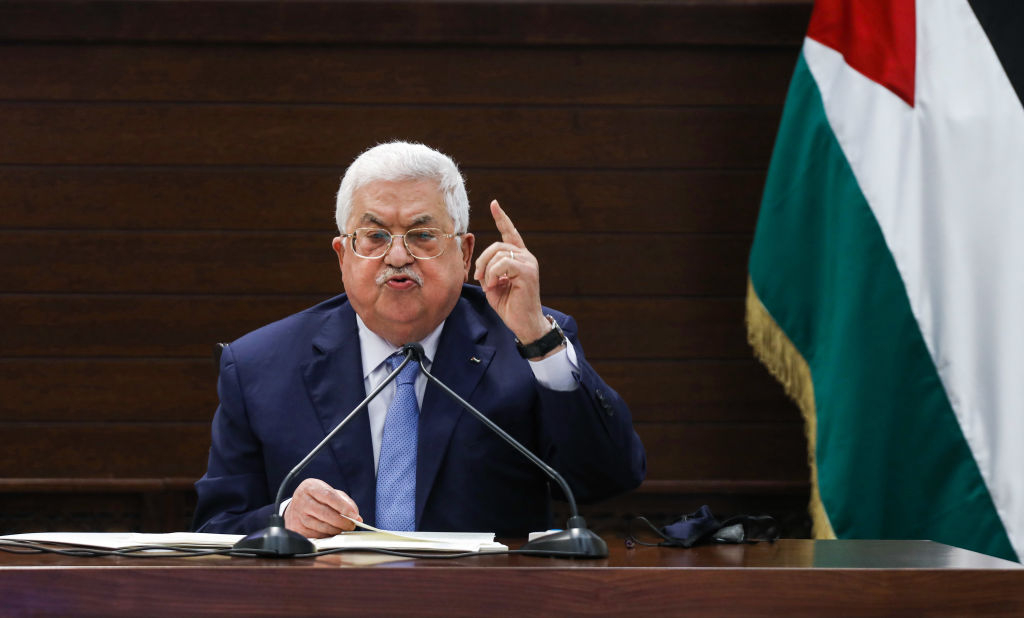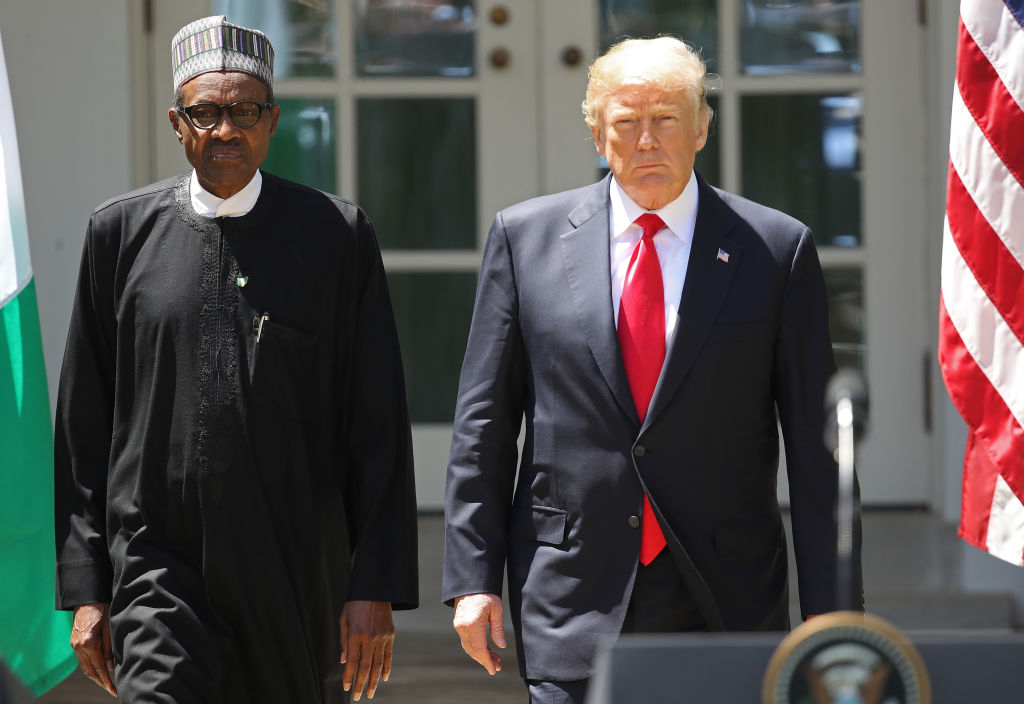In this mailing: - Khaled Abu Toameh: Palestinians: What Needs to Be Done
- Raymond Ibrahim: "Why Are You Killing Christians?" Trump Asks Nigeria's President
- Amir Taheri: American Election: Endgame for Party System?
by Khaled Abu Toameh • October 25, 2020 at 5:00 am The question is: Will Iran step in to influence the Palestinian Authority? Will Iran manage to convince the Palestinian Authority to become part of an axis that includes Hamas, Hezbollah, the Houthis, and all the Iranian‑backed militias in Iraq? Where is Mahmoud Abbas taking the Palestinian Authority? No one knows. Most people I speak to they say he doesn't really have a strategy to deal with the with the Middle East conflict. His only strategy, they say, is just to remain in power forever. The Palestinians.... are further isolating themselves by alienating the entire Arab world by going against countries such as Egypt, Jordan and all these Gulf states that once used to give them a lot of money.... Those who were inciting against Israel all those years are now inciting against the Arab world. Those who were demonizing Israel are now trying to demonize their own Arab and Muslim brothers.... The gap between the Palestinians and the Arab world is growing. One of the reasons why mainstream media does not want to report about many stories over here, is that these stories do not have an anti‑Israel angle. This whole conflict, whether we like it or not, is not about a settlement, a checkpoint, a wall, and a fence or a settlement. This conflict is really about Israel's very existence.... They [Palestinian leaders] do not want Arabs and Muslims to be exposed to the wonderful things that are happening in Israel. They do not want them to see that Israel has been a story of success. They do not want these wonderful things to be seen in the Arab and Muslim world because then the Arabs and Muslims might go to their leaders and say, "Excuse me. We want something like what these Jews have. Why can't we have democracy? Why can't we have a functioning parliament?" The question we need to ask ourselves is not who is going to succeed Mahmoud Abbas. The question is will anyone who succeeds Mahmoud Abbas, will he be different? Will he be able to bring about any changes? I'm sorry to tell you that the answer is no.... We are talking about the same ideology, the same mentality, and the same people running the show. Do not expect many changes in the post‑Abbas era. What needs to change is the mindset. What needs to stop is the incitement, the daily delegitimization of Israel. It is very bad, and it is very widespread. If you do not change that, then you will not see any changes. In addition, the Palestinians need to change their education system. They need to start preparing their people for peace with Israel.
 Will Iran step in to influence the Palestinian Authority? Will Iran manage to convince the Palestinian Authority to become part of an axis that includes Hamas, Hezbollah, the Houthis, and all the Iranian‑backed militias in Iraq? Where is Mahmoud Abbas taking the Palestinian Authority? Pictured: Abbas on September 3, 2020, in Ramallah. (Photo by Alaa Badarneh/Pool/AFP via Getty Images) There is now an agreement, the Abraham Accords, between Israel and the United Arab Emirates and Bahrain, but how do the Palestinians see it? Where do they think it could lead? The Palestinians were caught by surprise. I remember when it was announced, I was calling Palestinian officials in Ramallah trying to get their reaction to this agreement. They were in disbelief. They were in shock. Many of these officials even asked me if I was sure it was true. Shortly afterwards, they issued a strongly‑worded statement lashing out at the United Arab Emirates: "Oh, the Gulf States have betrayed us. This is a stab in the back. This is a violation of all agreements." Continue Reading Article by Raymond Ibrahim • October 25, 2020 at 4:30 am In just the first four months of 2020, Fulani herdsmen and other terrorists "hacked to death ... no fewer than 620 defenseless Christians," and engaged in the "wanton burning or destruction of their centers of worship and learning." How have formerly simple and unarmed Fulani herdsmen managed to kill, since 2015, nearly twice as many Christians as the "professional" terrorists of Boko Haram....? "Since the government and its apologists are claiming the killings have no religious undertones, why are the terrorists and herdsmen targeting the predominantly Christian communities and Christian leaders?" -- The Christian Association of Nigeria, International Centre for Investigative Reporting, January 21, 2020.
 "Why are you killing Christians?" US President Donald J. Trump apparently shocked his Nigerian counterpart, Muhammadu Buhari, by asking this question the first time they met in the White House in April 2018. He should not have been shocked. Several international observers characterize what Nigerian Christians experience not just as "persecution" but as a "pure genocide." Pictured: Trump and Buhari on April 30, 2018, in Washington, DC. (Photo by Win McNamee/Getty Images) "Why are you killing Christians?" US President Donald J. Trump apparently shocked his Nigerian counterpart, Muhammadu Buhari, by asking this question the first time they met in the White House in April 2018. The Nigerian president admitted this, according to a September 8, 2020 report, toward the end of a recent talk with his cabinet members: "[W]hen I was in his office, only myself and himself, with Allah as my witness, he looked at me in the face and said 'why are you killing Christians?' I wonder, if you were the person how you would react? I hope what I was feeling inside did not betray my emotion..."
He should not have been shocked. Several international observers characterize what Nigerian Christians experience not just as "persecution" but as a "pure genocide." Continue Reading Article by Amir Taheri • October 25, 2020 at 4:00 am The American two-party system resembles cartel arrangements in business: it restricts access to power to two gigantic machines that, like big business driving out little business, prevent diversity and competition on a large scale. As a result, small radial groups are forced to infiltrate the two parties and push them in directions not necessarily wanted by the mass of their followers. The two-party system offers unusual political stability. The reverse side, however, is that it narrows policy options to two and the role of elections to deciding the exercise of power rather than its substance.
 (Image source: iStock) Does the current presidential campaign in the United States have an ideological content? Having covered six of the last nine campaigns as a reporter and followed the other three from the sidelines my answer is "yes and no". Let's start with the no side of my equivocal answer first. The current campaign is focused on two themes that leave little room for the broader questions the US faces with dramatic demographic, cultural and societal changes at home and the crumbling structure of world order. The first theme of the campaign has been the personality of Donald J Trump. No leader in American history has been the subject of such vilification as Trump. Continue Reading Article |
|
|
No comments:
Post a Comment